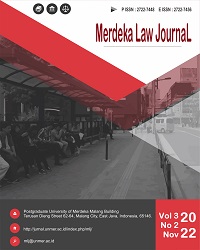Tinjauan Yuridis terhadap Pemeriksaaan Saksi dalam Perkara Pidana pada Persidangan secara Teleconference di Masa Pandemi Covid-19
DOI:
https://doi.org/10.26905/mlj.v3i2.9213Keywords:
Persidangan secara Teleconference, Pemeriksaan Saksi.Abstract
This study aims to examine the validity of remote witness examination (teleconference) at trials during the Covid-19 pandemic and the evidentiary power of remote witness examination (teleconference) at court hearings. This study uses normative legal research methods. The results showed that the use of teleconferences in criminal trials is legal / valid in order to obtain material truth, by applying the provisions of the Criminal Procedure Code in principle not violating the provisions of the applicable Law and as long as the witness meets the following conditions: a) Witnesses must first take an oath. b) Witness testimony is stated orally through audio-visual communication devices/ teleconference at the trial. c) The content of the testimony must be about what the witness saw, heard, and experienced, and mention the reason for the knowledge. d) The witness testimony is consistent with each other. The evidentiary power of testimony through video conferencing in criminal trials is strong.
Downloads
References
Alfitra. (2011). Hukum Pembuktian dalam Beracara Pidana, Perdata dan Korupsi di Indonesia. Jakarta: Raih Asa Sukses, h. 28.
Bar-Siman-Tov, I. (2020). Covid-19 meets politics: the novel coronavirus as a novel challenge for legislatures. Theory and Practice of Legislation, 8(1–2), 11–48. https://doi.org/10.1080/20508840.2020.1800250
Corsi, J. R. (1978). Telephone conferencing in administrative hearings. Telecommunications Policy, 2(3), 249–251. https://doi.org/10.1016/0308-5961(78)90030-7
Desson, Z., Weller, E., McMeekin, P., & Ammi, M. (2020). An analysis of the policy responses to the COVID-19 pandemic in France, Belgium, and Canada. Health Policy and Technology, 9(4), 430–446. https://doi.org/10.1016/j.hlpt.2020.09.002
Edge, P. W. (2013). Foreign lawyers practising national law: temporary counsel in small jurisdictions. International Journal of the Legal Profession, 20(3), 285–314. https://doi.org/10.1080/09695958.2014.897015
Hecht, J., Teresi, D., Frantzich, S. E., McCredie, J. W., Norman, A., Lawrence, V. B., & Kimmel, M. (2009). Communication Booknotes (Issue November 2014). https://doi.org/10.1080/10948008309488484
Hermansyah, H. (2020). Sistem Pembuktian Pada Tindak Pidana Korupsi Dalam Rangka Pemberantasan Korupsi Di Indonesia. UNES Journal of Swara Justisia, 4(2), 133. https://doi.org/10.31933/ujsj.v4i2.155
Higginson, S., Milovanovic, K., Gillespie, J., Matthews, A., Williams, C., Wall, L., Moy, N., Hinwood, M., Melia, A., & Paolucci, F. (2020). COVID-19: The need for an Australian economic pandemic response plan. Health Policy and Technology, 9(4), 488–502. https://doi.org/10.1016/j.hlpt.2020.08.017
Ilmiyah, N. (2020). Relevansi Pemikiran Ibnu Qoyyim. Al-Jinayah: Jurnal Hukum Pidana Islam, 6(2).
Kamber, K., & Markić, L. K. (2021). Administration of Justice During The Covid-19 Pandemic and The Right to a Fair Trial. EU and Comparative Law Issues and Challanges Series (Eclic), 5, 1049–1083.
Karjadi dan Soesilo. (1997). Kitab Undang-Undang Hukum Acara Pidana dengan Penjelasan Resmi serta Peraturan Pemerintah R.I No. 27 tahun 1983 ten-tang Pelaksanaannya. Bogor: Politeia.
Kumala, M. P. (2021). Kajian Yuridis Asas Pembalikan Beban Pembuktian Dan Asas Actori Incubit Probatio. AL YASINI: Jurnal Keislaman, Sosial, Hukum Dan Pendidikan, 06(02), 272–278.
Legg, M. (2021). The COVID-19 Pandemic, the Courts and Online Hearings: Maintaining Open Justice, Procedural Fairness and Impartiality. Federal Law Review, 49(2), 161–184. https://doi.org/10.1177/0067205X21993139
Ligasetiawan, E., Hukum, F. N.-U. J., & 2022, U. (2022). Prinsip Kehadiran Terdakwa pada Persidangan Pidana Elektronik di Masa Pandemi Covid-19: Perbandingan Indonesia dan Belanda. Undang: Jurnal Hukum, 5(1), 69–103. https://doi.org/10.22437/ujh.5.1.69-103
Syarifuddin, M. (2020). Transformasi Digital Persidangan di Era New Normal. In PT. Imaji Cipta Karya.
Syarnubi, R. A., Alamsyah, B., & Syarifuddin, A. (2019). Kebijakan Pidana Dalam Pengaturan Asas Peradilan Cepat, Sederhana Dan Biaya Ringan Dalam Hukum Acara Pidana. Legalitas: Jurnal Hukum, 10(1), 36. https://doi.org/10.33087/legalitas.v10i1.156
The Law Society of England and Wales. (2018). Technology, Access to Justice and the Rule of Law.
Tiirinki, H., Tynkkynen, L. K., Sovala, M., Atkins, S., Koivusalo, M., Rautiainen, P., Jormanainen, V., & Keskimäki, I. (2020). COVID-19 pandemic in Finland – Preliminary analysis on health system response and economic consequences. Health Policy and Technology, 9(4), 649–662. https://doi.org/10.1016/j.hlpt.2020.08.005
Townend, J., & Magrath, P. (2021). Remote trial and error: how COVID-19 changed public access to court proceedings. Journal of Media Law, 13(2), 107–121. https://doi.org/10.1080/17577632.2021.1979844
Undang-Undang Nomor 8 Tahun 1981 Tentang Hukum Acara Pidana Pasal 1 Angka 27.
Undang-Undang Tentang Kitab Undang-Undang Hukum Acara Pidana, UU Nomor 8 Tahun 1981, Pasal 183.
Undang-Undang Nomor 8 Tahun 1981 Tentang Kitab Undang-Undang Hukum Acara Pidana, Pasal 184.
Undang-Undang Nomor 8 Tahun 1981 Tentang Hukum Acara Pidana Pasal 185 Ayat (1).
Undang-Undang Nomor 8 Tahun 1981 Tentang Hukum Acara Pidana Pasal 185 ayat (7).
Undang-Undang Nomor 13 Tahun 2006 Tentang Perlindungan Saksi dan Korban Pasal 5 Ayat (1).
Downloads
Published
How to Cite
Issue
Section
License
Authors who publish in this journal agree to the following terms: MLJ Merdeka Law Journal is licensed under Creative Commons Attribution-ShareAlike 4.0 International. Creative Commons Attribution-ShareAlike 4.0 International License (CC BY 4.0) is applied when mandated by research funders, such as those who have signed. Open Access articles in MLJ Merdeka Law Journal are published under the Creative Commons Attribution-Share Alike 4.0 International (CC BY 4.0) license. The copyright of the received article shall be assigned to the journal as the publisher of the journal. The intended copyright includes the right to publish the article in various forms (including reprints). The journal maintains the publishing rights to the published articles. Authors must agree to the copyright transfer agreement by checking the Copyright Notice column at the initial stage when submitting the article.






